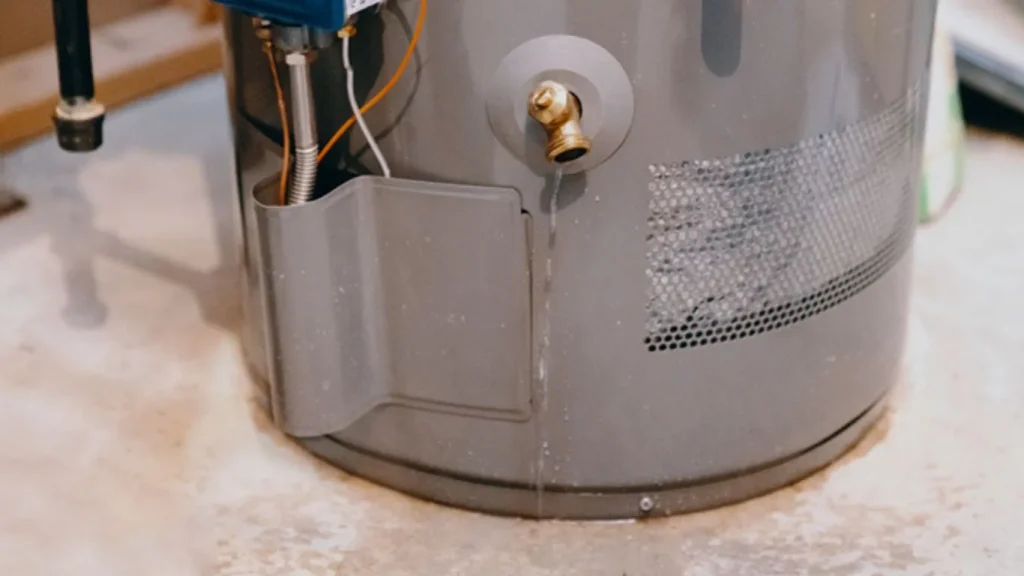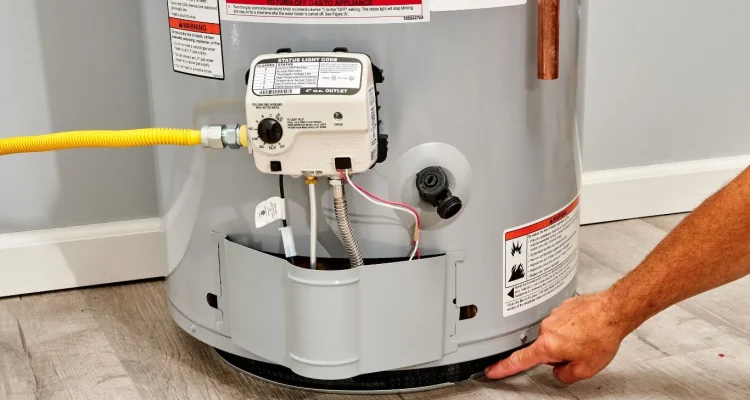Introduction
Hot water heaters are essential appliances in modern homes, providing the convenience of warm water for showers, cleaning, and cooking. However, a common issue that homeowners face is a leaking water heater. This problem can range from minor drips to major leaks, potentially causing water damage and escalating utility bills. Understanding the causes, signs, and solutions for a leaking hot water heater is crucial for maintaining a safe and efficient home environment.

Understanding Hot Water Heaters
Hot water heaters come in various types, each functioning differently but serving the same purpose of heating water for domestic use.
Types of Hot Water Heaters
- Conventional Water Heaters: These heaters store heated water in a tank until it’s needed.
- Tankless Water Heaters: Also known as on-demand water heaters, these units heat water directly without the use of a storage tank.
Common Causes of Hot Water Heater Leaks
Identifying the source of a hot water heater leak is essential for effective repair or replacement.
1. Pressure Build-Up Issues
Hot water heaters are designed to handle specific pressures, but when this balance is disrupted, leaks can occur.
1.1 Overpressure in the Tank
Excessive pressure can cause the tank to expand and weaken, leading to leaks.
1.2 Temperature and Pressure Relief Valve (TPR Valve) Malfunction
If the TPR valve fails to release excess pressure, it can cause leaks or even a burst tank.
2. Loose or Damaged Drain Valve
The drain valve at the bottom of the tank can loosen over time or become damaged, resulting in water leakage.
3. Corrosion and Rust
Internal corrosion is a common issue in older water heaters, especially those that haven’t been properly maintained.
3.1 Sediment Build-Up
Mineral sediment can accumulate at the bottom of the tank, promoting corrosion and weakening the tank structure.
3.2 Anode Rod Decay
Anode rods are sacrificial components that prevent corrosion by attracting corrosive elements. When they decay, the tank becomes vulnerable to rust.
4. Internal Tank Damage
Physical damage to the tank, such as cracks or holes, can lead to significant leaks.
4.1 Cracks or Holes in the Tank
Structural damage can occur due to aging, poor installation, or external factors.
4.2 Welding Seams Issues
Faulty welding seams in the tank can weaken over time, causing leaks.
5. Plumbing Connections and Fittings
Faulty connections or fittings in the plumbing lines connected to the water heater can also cause leaks.
5.1 Loose or Faulty Connections
Improper installation or wear and tear can lead to leaks at connection points.
5.2 Sealant Deterioration
Seals and gaskets that deteriorate over time can allow water to escape.
Signs of a Leaking Hot Water Heater
Detecting a leak early can prevent extensive water damage and costly repairs.
1. Puddles or Dampness Around the Heater
Visible water accumulation near the water heater is a clear sign of a leak.
2. Unexplained Increase in Water Bills
A sudden rise in water bills without increased usage may indicate a hidden leak.
3. Rusty or Discolored Water
Brown or rusty water coming from taps suggests internal corrosion in the water heater.
4. Strange Noises from the Heater
Popping or rumbling sounds can indicate sediment buildup or overheating, leading to leaks.
5. Fluctuating Hot Water Temperatures
Inconsistent hot water temperatures may indicate a malfunctioning water heater due to leaks or other issues.
What to Do If Your Hot Water Heater Is Leaking
Addressing a leaking water heater promptly can mitigate damage and ensure safety.
1. Turn Off the Water Supply
Locate the shut-off valve near the water heater and turn off the water supply to prevent further leakage.
2. Shut Off the Power or Gas Supply
For electric water heaters, turn off the power at the breaker. For gas heaters, turn off the gas supply.
3. Identify the Source of the Leak
Inspect the heater carefully to determine where the leak is originating from.
4. Contact a Professional Plumber
Unless you’re experienced with water heater repairs, it’s best to contact a licensed plumber for diagnosis and repair.
5. Consider Repair or Replacement Options
Based on the plumber’s assessment, decide whether to repair the existing water heater or replace it with a new unit.
Preventing Hot Water Heater Leaks
Regular maintenance can extend the life of your water heater and prevent leaks.
1. Regular Maintenance Checks
Inspect your water heater annually for signs of leaks, corrosion, or other issues.
2. Flushing the Tank Annually
Flush the tank annually to remove sediment buildup and prevent corrosion.
3. Checking and Replacing Anode Rods
Inspect and replace anode rods as recommended by the manufacturer to protect against corrosion.
4. Monitoring Water Pressure
Ensure that water pressure remains within safe limits to prevent overpressure-related leaks.
5. Addressing Plumbing Issues Promptly
Promptly repair any plumbing leaks or issues connected to the water heater to prevent secondary damage.
FAQs About Hot Water Heater Leaks
1: Can a leaking water heater be repaired?
Yes, depending on the severity and location of the leak, a professional plumber can often repair a leaking water heater.
2: How often should I flush my hot water heater?
It’s recommended to flush your hot water heater at least once a year to remove sediment and prevent corrosion.
3: What is the average lifespan of a water heater?
The average lifespan of a water heater is around 10-15 years, depending on maintenance and usage.
4: Is water heater leaking dangerous?
Yes, a leaking water heater can cause water damage, mold growth, and in some cases, electrical hazards.
5: How much does it cost to fix a leaking water heater?
The cost varies depending on the extent of the damage and the type of repair needed, ranging from minor repairs to full unit replacements.
Conclusion
A leaking hot water heater is a common household issue that requires prompt attention to prevent further damage and ensure the continued functionality of your water heating system. By understanding the causes, signs, and preventive measures outlined above, homeowners can effectively manage and mitigate the risks associated with hot water heater leaks.


Congratulation!